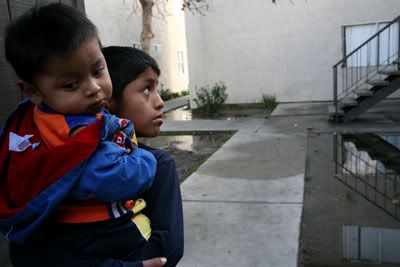MIGRATION AND MENTAL HEALTH: RESEARCH ABSTRACT
 By Gilberto LopezWhile it may provide financial benefits, migration can have high emotional costs. However, most studies analyzing the psychological and emotional effects of migration have been epidemiological or psychiatric in nature, conducted by research psychologists, public health organizations and psychiatrists. They do not usually explore the more phenomenological aspects of emotional health and rarely include individual or community-level narratives about how people themselves feel that migration has affected them emotionally. Further, studies tend to focus on migrants themselves, neglecting their non-migrating counterparts, often impacted by the migration of their family and community members.
By Gilberto LopezWhile it may provide financial benefits, migration can have high emotional costs. However, most studies analyzing the psychological and emotional effects of migration have been epidemiological or psychiatric in nature, conducted by research psychologists, public health organizations and psychiatrists. They do not usually explore the more phenomenological aspects of emotional health and rarely include individual or community-level narratives about how people themselves feel that migration has affected them emotionally. Further, studies tend to focus on migrants themselves, neglecting their non-migrating counterparts, often impacted by the migration of their family and community members. A much-debated issue at the heart of academic discourse is whether mental disorders are universally distributed and simply expressed differently in various cultural contexts, or whether the disorders themselves actually vary cross-culturally. In other words, are some psychopathological experiences particular to specific societies, or are these apparently ‘culture-bound’ syndromes, disorders and experiences merely psychiatric mental illnesses (as defined by the Diagnostic and Statistical Manual of Mental Disorders) disguised by local understandings and customs? To what extent does culture matter, if at all, to the experience, course and outcome of mental illness? To go further, how legitimate is it in the first place for Western clinicians to look elsewhere for entities so obviously of their own making? If these entities are culturally constructed, what does it mean to ‘discover’ that such classifications can be applied in other settings, to quite foreign ‘selves’ undergoing what appear to be a phenomenologically diverse set of ‘breakdowns’?
A much-debated issue at the heart of academic discourse is whether mental disorders are universally distributed and simply expressed differently in various cultural contexts, or whether the disorders themselves actually vary cross-culturally. In other words, are some psychopathological experiences particular to specific societies, or are these apparently ‘culture-bound’ syndromes, disorders and experiences merely psychiatric mental illnesses (as defined by the Diagnostic and Statistical Manual of Mental Disorders) disguised by local understandings and customs? To what extent does culture matter, if at all, to the experience, course and outcome of mental illness? To go further, how legitimate is it in the first place for Western clinicians to look elsewhere for entities so obviously of their own making? If these entities are culturally constructed, what does it mean to ‘discover’ that such classifications can be applied in other settings, to quite foreign ‘selves’ undergoing what appear to be a phenomenologically diverse set of ‘breakdowns’? In attempting to reconcile this problem, anthropologist Arthur Kleinman introduces the concept of explanatory models, which assist us in making sense of illness in our society and give us insights to the origin, composition, diagnosis and treatment of illness. Explanatory models do not follow a fixed methodology in identifying or addressing illness; they follow local worldviews.The focus of our research is the mental health of Mixteco migrants and non-migrants. More specifically, it attempts to answer the question: what are the emotional impacts of migration and the economic crisis for migrants and non-migrants? Using Kleinman’s theory of explanatory models, we look at migrant and non-migrant health epistemologies, status and services. We attempt to answer: (a) how have migration and the economic crisis affected knowledge and beliefs about mental health among migrants and non-migrants? (b) How have migration and the economic crisis affected the mental health status of migrants and non-migrants? And (c) how have migration and the economic crisis affected use of mental health services of migrants and non-migrants?Bio: Gilberto Lopez is a visiting graduate student at UCSD’s Center for Comparative Immigration Studies (CCIS). He received BA’s in Anthropology and in Chicano Studies, with a minor in Philosophy, from Fresno State University and received his MA in medical anthropology from Southern Methodist University. He is currently in concurrent graduate programs in medical anthropology (PhD) at Southern Methodist University, and in public health (MPH) at Johns Hopkins University. He has been part of various research projects, including: applied work among health promotoras in rural Mexico, applied work with clinicians at a community clinic catering to low income patients, and applied work with military veterans with spinal-cord injuries.Photos courtesy of David Bacon.
In attempting to reconcile this problem, anthropologist Arthur Kleinman introduces the concept of explanatory models, which assist us in making sense of illness in our society and give us insights to the origin, composition, diagnosis and treatment of illness. Explanatory models do not follow a fixed methodology in identifying or addressing illness; they follow local worldviews.The focus of our research is the mental health of Mixteco migrants and non-migrants. More specifically, it attempts to answer the question: what are the emotional impacts of migration and the economic crisis for migrants and non-migrants? Using Kleinman’s theory of explanatory models, we look at migrant and non-migrant health epistemologies, status and services. We attempt to answer: (a) how have migration and the economic crisis affected knowledge and beliefs about mental health among migrants and non-migrants? (b) How have migration and the economic crisis affected the mental health status of migrants and non-migrants? And (c) how have migration and the economic crisis affected use of mental health services of migrants and non-migrants?Bio: Gilberto Lopez is a visiting graduate student at UCSD’s Center for Comparative Immigration Studies (CCIS). He received BA’s in Anthropology and in Chicano Studies, with a minor in Philosophy, from Fresno State University and received his MA in medical anthropology from Southern Methodist University. He is currently in concurrent graduate programs in medical anthropology (PhD) at Southern Methodist University, and in public health (MPH) at Johns Hopkins University. He has been part of various research projects, including: applied work among health promotoras in rural Mexico, applied work with clinicians at a community clinic catering to low income patients, and applied work with military veterans with spinal-cord injuries.Photos courtesy of David Bacon.